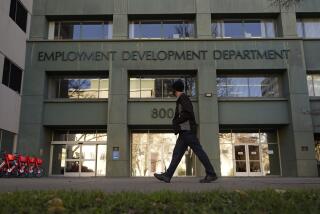Fraud case against Alfred Villalobos is revived
Reporting from Sacramento â California won a court order reviving a stalled fraud lawsuit against Alfred J.R. Villalobos, a former board member at the California Public Employeesâ Retirement System accused of plying pension fund officials with luxury trips and gifts to influence investment decisions.
A federal judge said the stateâs action should not have been shelved when Villalobos filed a bankruptcy petition in June 2010.
California can use its police powers to âprotect the public safety and welfareâ even though Villalobos is seeking protection from creditors under bankruptcy laws, said U.S. District Judge Edward C. Reed in Reno.
He granted the California attorney generalâs office an exemption from the U.S. Bankruptcy Codeâs automatic stay of the case against Villalobos and former CalPERS Chief Executive Federico Buenrostro Jr.
Reedâs decision gives governments the ability to go after fraud suspects who try to escape lawsuits by declaring bankruptcy, said Lynda Gledhill, a spokeswoman for California Atty. Gen. Kamala D. Harris.
âWe are very pleased but not surprised by the decision,â she said. âThis will become seminal by allowing law enforcement to proceed with cases even when defendants run into bankruptcy protection.â
CalPERS Chief Executive Anne Stausboll said the system âlooks forward to the successful prosecution of any ethical breaches and misconduct by former CalPERS officials and seeing those who harmed the system brought to justice.â
Lawyers for Villalobos did not respond to requests for comment. Buenrostro declined to comment.
The stateâs complaint, filed in Los Angeles County Superior Court, accuses the defendants of committing securities fraud, selling securities without broker-dealer licenses and violating state unfair competition laws.
It seeks $95 million in civil penalties and demands that profits be given up and that restitution be made to the pension fund.
Villalobos was paid more than $47 million in commissions by private equity and real estate investment managers to help them win CalPERS contracts to manage about $4.8 billion worth of the fundâs securities from 2005 to 2009, the lawsuit said.
The state alleged that Buenrostro, the top official at CalPERS from 2002 to 2008, took gifts worth tens of thousands of dollars from Villalobos.
He became a Villalobos associate one day after retiring from CalPERS.
Villalobos and Buenrostro face related investigations over the activities of intermediaries, known as placement agents, in investment deals.
âFederal and state investigators have been focused for some time on whether civil or criminal laws may have been violated in connection with these placement agent matters and related activities,â according to an internal review commissioned by CalPERS and released in March.
Villalobos and Buenrostro have both denied any wrongdoing.
The revival of the fraud trial comes as a settlement appears imminent in Villalobosâ bankruptcy proceeding.
A June 17 court document said a tentative agreement had been reached after several months of negotiations among unsecured creditors, Villalobos, three of his companies and the attorney generalâs office.
Terms of the agreement have been sealed by a Bankruptcy Court judge to give Harris time to review and approve the document, said Jeffrey L. Hartman, the lawyer for the creditors committee.
The attorney generalâs office and CalPERS declined to comment on the tentative agreement.
The settlement probably would spell out how much the various creditors receive from Villalobosâ estate. At the time the bankruptcy petition was filed, his assets included a Lake Tahoe mansion and 15 other residences, 21 bank accounts, a fleet of luxury automobiles, artwork and a collection of French Bordeaux wines.
A deal also would characterize and prioritize the claims of dozens of creditors, including the Internal Revenue Service, the state of California, private equity investment managers, banks and three Nevada casinos.
It also could lay out any commitment by Villalobos to cooperate in the continuing law enforcement investigation, said Dave Meegan, a Sacramento bankruptcy lawyer.
âA component of a settlement is how it affects the estate,â Meegan said. âThe other component is how it affects him post-bankruptcy.â
More to Read
Inside the business of entertainment
The Wide Shot brings you news, analysis and insights on everything from streaming wars to production â and what it all means for the future.
You may occasionally receive promotional content from the Los Angeles Times.











